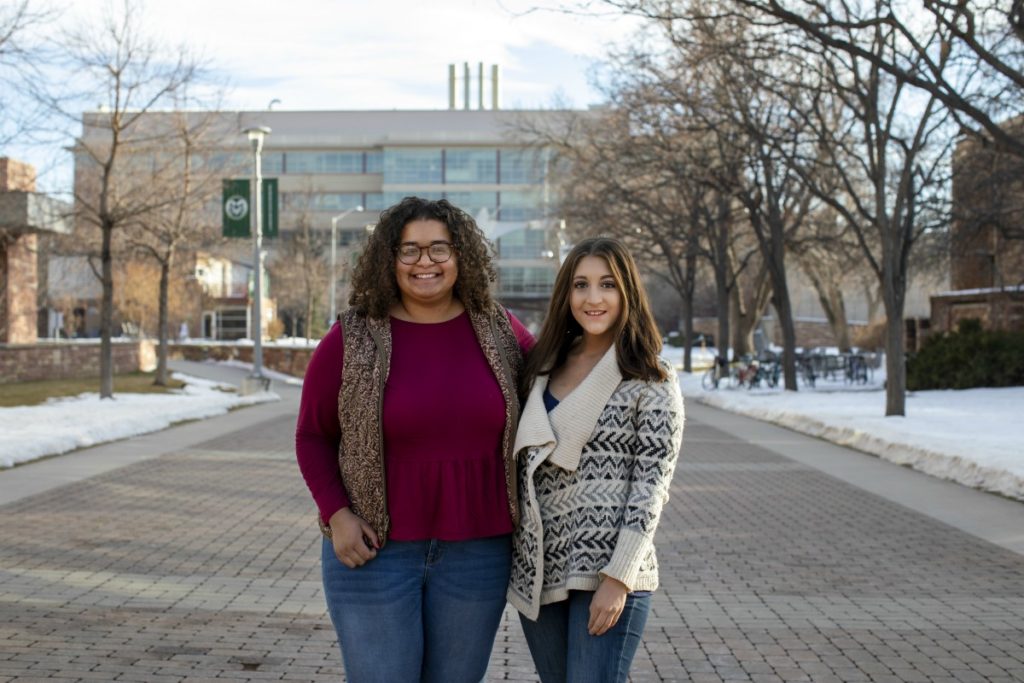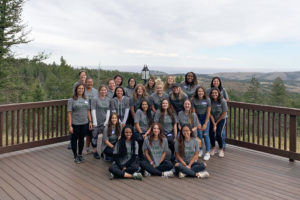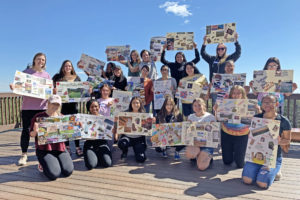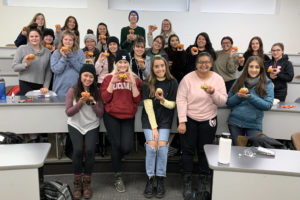
Editor’s note: The HDFS Peer Mentoring program is currently seeking applicants for mentors – priority deadline is April 2, 2021. Learn more and apply.
One in four Colorado State University students identifies as first generation. This statistic is often quoted and has become a source of pride at the University. Because their parents do not have a four-year degree (they may have a two-year degree or other schooling), first-generation students are often defined by challenges they face – and they do face unique challenges such as navigating university policies, procedures, jargon, and expectations. The Department of Human Development and Family Studies at CSU has launched a new mentoring program to help foster community among first-generation students and support their successful transition to college.

The program aims to help both first-generation and students of color succeed inside and outside of the classroom. The mentoring program pairs upperclassmen with incoming students to help them navigate the new challenges they face in college and feel a sense of community and belonging. Unlike some of their peers, first-generation students cannot rely on their parents’ experiences and knowledge of college to help them with these challenges. As a result, they bring with them incredible resilience, determination, and vision for earning their college degree. In this way, first-generation students are truly pioneering their path – they are trail blazers.
“The mentoring program was developed in order to assist with retention of students in the major,” said Katie Ditter, director of undergraduate advising in the department. “Our hope was that through this program, students would be able to build a community that allows mentors to utilize their knowledge and skills to help new students with their transition to college, and ultimately feel more connected to HDFS.”
In 2018, faculty and staff in the department established the program with a cohort of 12 students; six mentors and six mentees. The feedback from those students helped shape and guide the program for this year’s students.
Building relationships
Freshmen coming into the HDFS program who identify as a first-generation student or student of color are paired with a junior or senior who shares the same identity and similar interests. During the school year, mentor and mentee pairs have meals together, attend campus events, and study together. Outside of school, students also participate in fun activities. To kick off the school year, students participate in an overnight retreat in the mountains where they engage in community-building activities, a ropes course, and set goals for the year ahead. Ditter partners with Assistant Professor Lily Ortega and Lucy Paltoo-Brady, academic success coordinator, to manage the program.
Watch the video below to hear mentor and mentee pairs share their experience with the program.
First-generation student Ashleigh Zamarripa is a junior majoring in early childhood education and teacher licensure. She has been a mentor since August 2019 to Diana Christiansen. With a background in mentoring students from her high school poms team to mentoring first-grade students, Zamarripa knew she wanted to help incoming HDFS students.
“I was intrigued by the idea of mentoring an incoming freshman because I had a hard time transitioning into college life my first semester and finding my place on campus,” she said. “Getting involved really makes a difference, so I wanted to help support someone in their first year of college get involved and feel connected at CSU.”
Diana Christiansen has been Zamarripa’s mentee since the fall 2019 semester. Christiansen is a first-year HDFS student with a concentration in early childhood education. She decided to get involved with the mentoring program because of the guidance and leadership it would provide while she transitions into college.
“The mentoring program has allowed for me to adjust quicker and not feel so alone on such a huge campus,” Christiansen said.
Leadership course

The students participate in a one-credit course that meets on a weekly basis to develop leadership skills as a mentor and gain information and support as a mentee. As the semester progresses, students provide feedback about their feeling towards the program. Mentors plan discussions that involve various topics, including resiliency and relationship building. For this semester, each pair is researching a specific aspect of mentoring that will be presented later in the semester.
They are also measuring the effectiveness and success of the program.
“Since the program is still relatively new, we are collecting all sorts of data including grades, how connected students feel to HDFS and CSU, and their perspectives on the program,” Paltoo-Brady said.
As a mentor, Zamarripa has various responsibilities that involve leadership, relationship building, and organization. “To me, being a mentor means developing a meaningful relationship with your mentee, being supportive of them and recognizing their individual needs/goals, and helping them achieve success in all aspects of their lives by being involved and connecting them to pertinent resources, events, and people,” she said.
Support first-generation student initiatives
Colorado State University’s annual Day of Giving takes place on March 12 and 13. New this year is the extension of the giving day to last for 1870 minutes, or a day and a half.

On this year’s Day of Giving, we encourage our college community to help support the College of Health and Human Sciences First Generation Student Success fund. This fund provides our first-generation students with access to valuable resources such as academic support, tutoring, mentoring programs, and professional development opportunities. Your gift will also have a ripple effect. As soon as CSU reaches 1,500 donors, a challenge gift to the first-generation fund of $10,000 (of a total $20,000 gift) from an anonymous donor will be unlocked.
Whether you’re an alum, a parent, an employee, or a student at CSU, you can show your support of our College’s first-generation students by contributing to this fund: make a gift now at our online giving page. Thank you for your generosity and support of CSU!
The Department of Human Development and Family Studies is a part of CSU’s College of Health and Human Sciences.